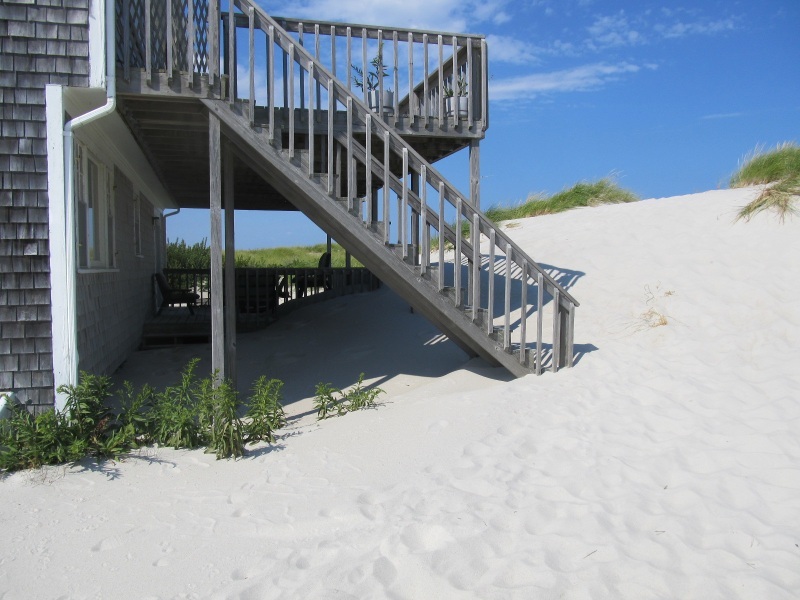Landscape Architecture for Landscape Architects › Forums › GENERAL DISCUSSION › Species selection and soil amendments for coastal tree planting
- This topic has 1 reply, 9 voices, and was last updated 14 years, 5 months ago by
 Jordan Lockman.
Jordan Lockman.
-
AuthorPosts
-
September 3, 2011 at 4:04 pm #160721
 Andrew Garulay, RLAParticipantSeptember 3, 2011 at 5:13 pm #160720
Andrew Garulay, RLAParticipantSeptember 3, 2011 at 5:13 pm #160720 RobotParticipant
RobotParticipantOkay, I don’t really know where this is, but I’ve got to believe there are some readily available resources for you to easily find this info. Looking at the photo, sure its a lot of grass…but that can’t be the native condition. What barrier island is this? I’m not familiar with MD’s barrier islands, but with a quick google search for maryland+barrier islands, I came up with Assateague Island. Is that where this is? If so, there are three agencies on the island: Assateague Island National Seashore and Assateague State Park in Maryland, and the Chincoteague National Wildlife Refuge in Virginia. I’m sure you could find out more information with a quick phone call to one of those organizations. If not, at least check the USDA Plants database or the book Seaside Plants of the Gulf and Atlantic Coasts
September 3, 2011 at 5:20 pm #160719 RobotParticipant
RobotParticipantResults from 2 minutes on the google machine:
September 3, 2011 at 7:52 pm #160718 Andrew Garulay, RLAParticipant
Andrew Garulay, RLAParticipantInstead of hiring a local firm that routinely deals with this environment, they hired a firm that is not familiar with the environment that they are working in – no knock on Geoffrey, just those that did not hire locally. Hiring a bigger firm from farther away is not in itself a bad thing. But if that firm gets into a portion of the project outside of their expertise and relies on existing staff rather than subbing out that portion or bringing in a consultant to ensure that the design is done properly it is not good. There is no doubt that it will eventually get hammered out to a design acceptable to the regulatory board and to the design professionals, but it will take a greater effort to do so and often a continuance or two. It sometimes makes for awkward moments when the presenter is hit with questions or comments when they are outside of their element.
You can go into any of the local civil engineering offices out here on Cape Cod (where I live & work) and each and everyone of them could rattle off a list of native plants appropriate for a coastal dune, a freshwater bordering vegetated wetland, a coastal bank, …etc, .. because they spend almost as much time presenting these things and negotiating mitigation and restoration as they do designing site plans. If those engineers came into it knowing nothing, the six to ten hearings that they hammer out with conservation commissions each month makes them experts in a few years – maybe not biologists, maybe not horticultulturists, maybe not landscape architects, but certainly experts in knowing how, what, where, and why such a planting is going to be accepted by the regulatory board. You’ll see lots of high profile LAs come down here from Boston and Cambridge and nine times out of ten the local engineer or environmental consultant has either been heavily involved in the mitigation/restoration portion of the project or they completely did it. More often than not the that other professional will present that portion of the plan. … and the other one of ten will defer to the local the next time they need to get wetlands permitting.
There are a number of wetland permitting consultants in the area as well that are not competitive with civil firms. I assume that coastal Maryland would have a similar regulatory climate and similar cottage industry associated with it.
Geoffrey, I would approach people in your firm about consulting with such a wetlands specialist. It is also a good relationship to have for future projects and could possibly get your firm referrals from them as well. Most are one person operations and very knowledgable about what each board and what each board member is hung up on. It can save a lot of egg on the face.
-
AuthorPosts
- You must be logged in to reply to this topic.



